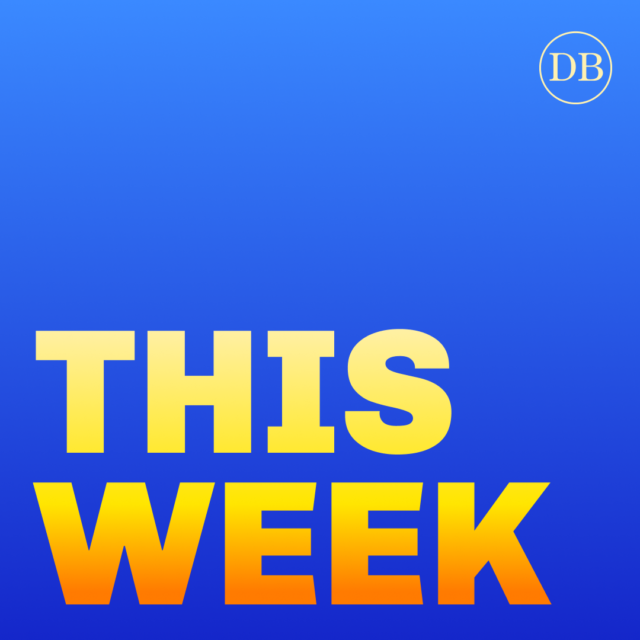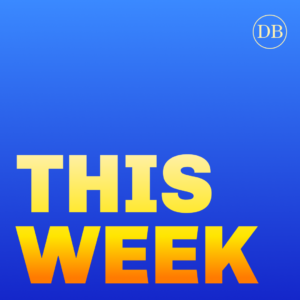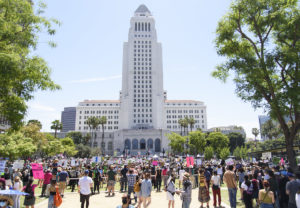The latest from the war in Gaza. The Supreme Court considers two major cases. Podcasts editor Jack Garland discusses these stories and more with Podcasts contributors Fonda Hu and Sofia Alcomendas. Matthew Royer, the National News and Higher Education editor for the Daily Bruin, joins the show.
Jack Garland: Today is Friday, March 1, and you’re listening to “This Week” by Daily Bruin Podcasts.
“This Week” is our weekly news podcast for college students. Every week we give you updates from around the world, across the country and on campus. I’m Jack Garland, and I’m the Podcasts editor.
Fonda Hu: And I’m Fonda, and I’m a Podcasts contributor and the international correspondent.
Sofia Alcomendas: And I’m Sofia Alcomendas, a Podcasts contributor and the national correspondent for today.
JG: And later on in the episode, we’ll be joined by National News and Higher Education editor for the Daily Bruin, Matthew Royer. Fonda, this is your first time on the podcast. Welcome on.
FH: I know, happy to be here, and happy leap year to you.
JG: Happy leap year to you too. We’re recording this podcast on Thursday like we do every week. And this week, we’re actually recording in a different area. So there might be some extra background noise, and we apologize for that in advance. All right, Fonda let’s get into the news. What is the biggest international story from this past week?
FH: So today’s top news covers talks of a ceasefire that have garnered more attention as the Islamic month of Ramadan approaches. Both parties are considering a ceasefire proposal that includes the exchange of Israeli hostages for Palestinian prisoners and a six-week pause in military operations. A draft of this framework is being considered by Hamas and Israel and was drawn up by France. It comes amid a looming Israeli invasion of Rafah, a city in Palestine with a current population of 1.4 million.
JG: There are always a lot of updates from the Israel-Gaza situation. So what else is going on there this week?
FH: On Monday, one of the key actors, Palestinian Authority Prime Minister Mohammed Shtayyeh, resigned in response to public calls for reform, and an interim unity government is expected to form to fill this gap in governance. Meanwhile, Prime Minister Netanyahu recently released a plan for a post-war Gaza, which notably does not include the Palestinian Authority. It also proposes that Israel will be responsible for the security of Gaza indefinitely. Recent figures placed the death toll in Gaza at 30,000, underscoring the exigency of a stop to the fighting.
JG: And what is the US doing now regarding these updates?
FH: Well, across the Atlantic, President Biden has expressed hopefulness of negotiations being finalized in the coming week, though this optimism has consistently been rebuked by both sides. Nonetheless, the U.S. role as a mediator in the conflict is significant, especially as pressure ramps up on the Biden administration to push for a ceasefire.
JG: And what’s the Bruin angle here?
FH: The updates in this conflict follow the recent Boycott, Divestment and Sanctions Movement that has swept the political bodies of the UC system, including the student government of UC Davis, the UCLA graduate student association, and most recently USAC. The whole world will be watching to see if this ceasefire pans out, and that includes many around the UCLA campus.
JG: Thank you for those updates on this evolving situation and what else is going on around the world.
FH: A bit further north, in a 188 to six vote, Hungary’s parliament approved a resolution to allow Sweden’s admission into NATO. Following the Russian invasion of Ukraine in February of 2022, Sweden applied to join NATO, which is the military alliance made up of the United States, Canada and 29 European countries. Under NATO rules, every member state of the alliance must agree before a new country joins. Hungary had initially held out because Viktor Orban, the country’s president, claimed that Swedish politicians were overly critical of Hungary’s democracy. However, Orban is now set to sign off on the parliament’s decision, marking a win for European security.
JG: The listeners might remember that we talked about Orban a few weeks ago because he was holding out on the European Union’s aid package for Ukraine. But he eventually came around to that as well. What else is going on around the world?
FH: In another NATO country, France’s Senate recently moved forward with legislation codifying abortion into its constitution. The bill is expected to be approved in a joint session of both houses of parliament early next week. The bill, endorsed by French President Emmanuel Macron, is a reaction to a recent controversy on the matter incited by a ruling by Alabama Supreme Court classifying embryos as children. France decriminalized abortion in 1975, and the right to an abortion appears to be a point of convergence across the political spectrum nationally.
JG: Thank you for those updates, Fonda.
FH: Thanks, Jack. Great to be here.
JG: Now we’re going to turn to the national news. Sophia, could you give us some updates?
SA: Yeah, on Wednesday, the Supreme Court decided that they would hear former President Donald Trump’s immunity claim. Last June, the Department of Justice filed an indictment against Trump, charging him with felony violations for his involvement with election interference in 2020. He pleaded not guilty to all counts in federal court. Trump also filed a motion to dismiss the case under the claim that presidents maintain almost total immunity from prosecution for any action while in office. The legal question the court is deciding on is “whether and to what extent a former President enjoys presidential immunity from criminal prosecution or conduct alleged to involve official acts during his tenure.” Trump’s lawyers are citing a 1982 Supreme Court ruling that endorses total immunity, arguing that his actions pertaining to the 2020 election aligned with his official duties.
JG: And so what comes next with this case?
SA: According to NBC News, the Supreme Court agreed to review Trump’s claim in late April, but in the meantime, the case is on hold, which means that no trial can occur. The timing indicates that the trial may not happen before the November election. The Supreme Court currently has a six to three conservative majority, but it’s unclear how they’ll decide on this case.
JG: And I’m sure that Trump has chimed in on this case. What is he saying about it?
SA: Yeah, the former president has taken to Truth Social, arguing that without immunity, a president will not be able to properly function or make decisions in the best interest of the United States of America.
JG: What’s the Broun angle for this story?
SA: Even though the case doesn’t have direct implications for UCLA students, the Supreme Court’s ruling could impact this year’s election. And if the justices rule in Trump’s favor, it would grant nearly complete immunity to the Office of the President. We should continue practicing our right to vote as it holds political figures accountable.
JG: And I heard some other news from the Supreme Court this week. Can you tell us about that?
SA: Yeah, so the Supreme Court heard arguments on Texas and Florida social media laws. The two states enacted laws limiting the ability of social media platforms to moderate what content appears on their platforms in light of concerns about censorship, hate speech and misinformation. The court’s main concern was on the extent to which the First Amendment applies to social media. A ruling could come later this year, and the Supreme Court decision could heavily influence the nature of litigation, where social media companies could be more broadly sued for content on their platforms.
JG: And I think that’s enough Supreme Court updates for this week. What else is going on?
SA: Well, the Federal Trade Commission is challenging Kroger’s acquisition of Albertsons. The FTC sued to block the merger between Kroger and Albertsons under charges that the merger would lead to higher prices for millions of Americans and the loss of competition would lead to lower quality products and services. Kroger CEO Rodney McMullen argued that the merger would be beneficial as it would make the stores a more compelling alternative to larger and nonunion competitors.
JG: All right, Sophia, thank you for those updates.
SA: Thank you for having me.
JG: And now we’re going to turn to Matthew for the Daily Bruin News update of the week. Thanks for coming on, Matthew.
Matthew Royer: Thank you, Jack.
JG: And what story are you talking about today?
MR: Yeah, this past Saturday, the United States Postal Service honored former UCLA men’s basketball coach John Wooden with a forever stamp that is now on sale. Multiple of his former players came to honor him, including Kareem Abdul-Jabbar, and a few others, including Jamaal Wilkes. It really was a celebration of his time at UCLA and the impact he had on so many, including just the campus community.
JG: And where can we get these stamps?
MR: The stamps are now being sold nationwide. And because they’re forever stamps, they’re always going to be equal in value to the current one-ounce rate of first-class mail. You get them at your local post office or online, or even, there’s been a few giveaways here on campus.
JG: So everyone knows the John Wooden Center, and they might know that he’s a famous basketball coach for UCLA. Can you tell us a little bit more about who John Wooden was?
MR: Yeah, John Wooden was, I guess considered the greatest basketball coach of all time. That’s not even editorializing. That’s just an accurate statement. He coached from 1948 to 1975 here at UCLA. He won 10 championships with the Bruins in a 12-year period. It’s crazy. He won seven in a row while at UCLA. You know, I guess the biggest accomplishment that everybody always talks about with him was that he had a group of teams that won 88 straight games over, I believe, a five-year period. So that’s just insane standards for, you know, the kind of coach he was, but also the leader he was. You know, that’s also why you see the pyramid of success all over campus. That was his idea. I believe UCLA Athletics coins it “that competitive greatness DNA.”
JG: And now he has his own stamp.
MR: Yeah, he does.
JG: Thanks for coming on Matthew.
MR: No problem.
SA: Thanks for listening today. Tune in next Friday for another episode of “This Week.”






Comments are closed.